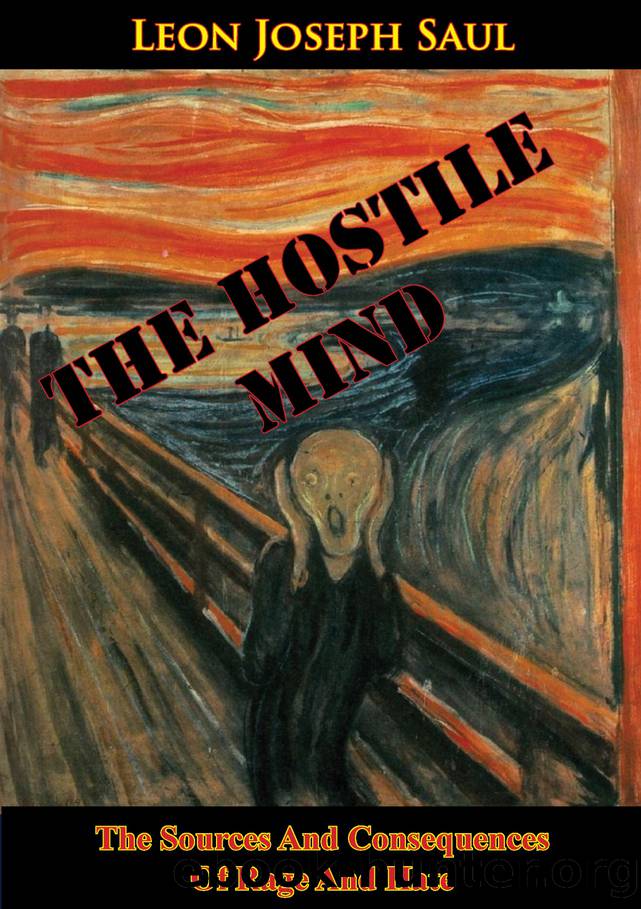The Hostile Mind: The Sources And Consequences Of Rage And Hate by Saul Leon Joseph;

Author:Saul, Leon Joseph;
Language: eng
Format: epub
Publisher: Hauraki Publishing
Published: 2015-11-14T00:00:00+00:00
CLASSIC NEUROSIS
We have noted in passing that if the term âneuroticâ is taken in its broadest meaning of any emotionally caused disorder resulting from influences during childhood which block and warp full development, then all of our categories (except certain cases of the âsublimatedâ) are various forms of neurotic disturbance. On the other hand, the word âneurosisâ was originally used in a restricted sense to apply to certain symptoms and combinations of them (that is, syndromes), especially those designated as hysteria, phobias and compulsion neurosis. It is these which were particularly studied and elucidated by Freud. As pointed out earlier in this book, the well-known mechanism of neurotic symptom formation is the disguised return from repression of strong, mostly infantile, emotional forces.
Because of the individualâs mature drives, his adult standards, his training and his conscience, these infantile forces are controlled and denied direct expression. But such unrelieved tensions affect the normal mature thought, behavior, vegetative functioning and even sensory perceptionâthat is, they cause symptoms. If the forces of maturity and restraint are inadequate and cannot master or offset the infantile motivations, then we see the mechanisms of criminal acting out of impulse-ridden behavior, of certain perversions, of masochism and of similar deficiencies of mature control. This is not neurosis in the classic and narrow sense of repression by conscience and re-emergence of the repressed infantile impulses as symptoms, but it is neurosis in the broad sense of the same disturbed psychic forces being at work, of adult emotional disorders resulting from the persistence of disordered childhood patterns.
To illustrate the dynamics of hostility in classic neurosis, let us select a simple, relatively common type of case and, for variety, one where there is a strong âreactiveâ element. Here the symptoms result from internal emotions which have been intensified by an external life situation.
A personable young woman came for treatment, complaining of anxiety. This anxiety was without content. She did not know what she was anxious about. But, nevertheless, she lived in a state of persistent fear and felt that this might portend some evil about to befall her family. She was married and had one child. The anxiety, it turned out, had developed in the course of a pregnancy and became much more severe when she left the small town in which she was reared and came with her husband and new baby to live in the metropolis to which his work brought him. Her anxiety now had mounted to the point where she was quite unable to enjoy anything in her life and began to fear she was headed for a nervous breakdown.
The salient feature of her childhood was overprotection. In common parlance, she had been a âspoiled child.â Her parents had seen to it that everything was done for her; even as she grew older her life had been a playtime with practically no responsibility. Both her father and mother were leading citizens in the town, and wherever their daughter went, she was welcomed and treated with deference. She knew âeveryoneâ and âeveryoneâ accepted and knew her.
Download
This site does not store any files on its server. We only index and link to content provided by other sites. Please contact the content providers to delete copyright contents if any and email us, we'll remove relevant links or contents immediately.
Depression by Adams Media(776)
Overcoming ADHD Without Medication : A Guidebook for Parents and Teachers by Children and Natural Psychology Association for Youth; Children The Association for Youth(757)
Out of the Mainstream: Helping the Children of Parents with a Mental Illness by Loshak Rosemary;(751)
The Noom Mindset by Noom(521)
Delphi Collected Works of Sigmund Freud (Illustrated) by Sigmund Freud(503)
The Psychology of Media and Politics by George Comstock & Erica Scharrer(431)
MANIPULATION & MIND CONTROL: The Persuasion Collection: Dark Psychology Secrets, Analyze & Influence People with Nlp. How to learn Reading Friends and Develop Body Language Skills. by ROBERT TOWER(417)
The 48 Laws of Mental Power: Overcoming Trauma and Building Mental Strength by Victor O. Carl(381)
Behold the Monster by Jillian Lauren(375)
It's nobody's fault: new hope and help for difficult children and their parents by Harold Koplewicz(374)
Directions in Technical Writing and Communication by Gould Jay R.;(370)
The Hypnotic Coach: A Conversational Hypnotherapy Tool Kit by Marion Jess(363)
Sigmund Freud by Janet Sayers;(334)
THE PSYCHOLOGY OF ENTREPRENEURSHIP; New Perspectives by Michael M. Gielnik; Melissa S. Cardon; Michael Frese(326)
Positive Psychology Across the Lifespan; An Existential Perspective by Piers Worth(319)
Mastering Flow: Perform Better, Experience More Joy, and Live a Happier Life by Nils Salzgeber(311)
The Modern Young Man's Guide to Manhood by Wayne Walker(308)
Mind Hacking Secrets and Unlimited Memory Power: 2 Books in 1: Learn How to Improve Your Memory & Develop Fast, Clear Thinking in 2 Weeks + 42 Brain Training Techniques & Memory Improvement Exercises by Sharp Scott(308)
Secrets of the Autistic Millionaire: Everything I know about Autism, ASD, and Asperger's that I wish I'd known back then... by David William Plummer(291)
